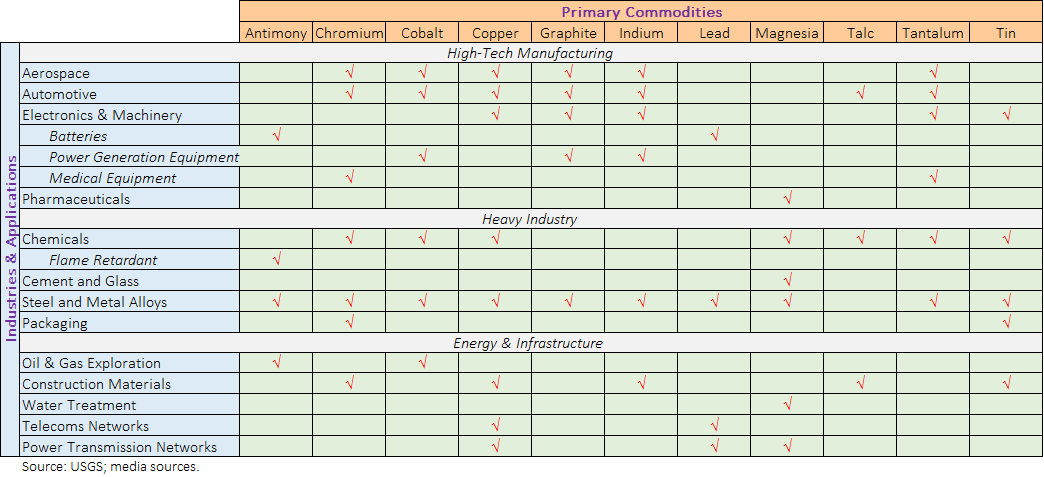United States Trade Representative takes action to advance challenges to China’s unfair trade practices that put American workers and businesses at a competitive disadvantage
Raw materials included in Obama Administration challenge are vital to a wide range of high-value American products in key industrial sectors
Washington, D.C. – United States Trade Representative Michael Froman announced today that the Obama Administration has successfully established a dispute settlement panel at the World Trade Organization (WTO) to examine China’s unfair export duties and quotas on eleven raw materials. These raw materials – including antimony, chromium, cobalt, copper, graphite, indium, lead, magnesia, talc, tantalum, and tin – are key inputs into a wide range of American products in vital industrial sectors, including: steel, automotive, aerospace, construction, and electronics.
The Office of the United States Trade Representative (USTR) called for a special meeting at the WTO to have the panel established quickly after China objected to and blocked the first U.S. request for panel establishment. By promptly moving forward with this action, USTR is resolved to ensure that American workers and businesses receive all the benefits that the United States has negotiated under our international trade agreements, and that American products can compete in the world marketplace on a level playing field.
“We will aggressively pursue this challenge on behalf of U.S. steelworkers, auto workers, aerospace workers, and the many Americans whose businesses, jobs, and livelihoods depend on the strength of these and other industries,” said Ambassador Froman. “China specifically committed to abide by fair, non-discriminatory access to raw materials when it joined the WTO. We intend to hold them to that commitment to ensure that our workers and businesses get all the economic opportunities they’re entitled to under our trade agreements.”
China’s export restraint measures on antimony, chromium, cobalt, copper, graphite, indium, lead, magnesia, talc, tantalum, and tin appear to be part of a continuing troubling industrial policy aimed at providing substantial competitive advantages for Chinese manufacturers at the expense of manufacturers elsewhere in the world.
Because of China’s position as a leading global producer of these raw materials, its export restraint measures give China the ability to affect global supply and pricing significantly. These measures can provide important advantages to China’s downstream producers, to the detriment of U.S. and other foreign counterparts. These measures also can create substantial pressure on foreign producers to move their operations, jobs, and technologies to China.
Additional Background on the United States’ Challenge
China imposes export restraints, including duties and quotas, on various forms of eleven raw materials: antimony, chromium, cobalt, copper, graphite, indium, lead, magnesia, talc, tantalum, and tin. Downstream products potentially affected by this challenge include:

China committed as part of the terms of its WTO accession to eliminate export duties for all products other than those listed in a specific annex. The export duties the United States is challenging are imposed on products not listed in that annex.
China also imposes export quotas on various raw materials. Article XI:1 of the General Agreement on Tariffs and Trade 1994 (GATT 1994) generally prohibits restrictions on exports other than taxes, duties, and charges. China’s WTO Accession Protocol also includes commitments not to restrict the right to export goods.
The WTO confirmed in two previous disputes brought by the United States (China – Measures Related to the Exportation of Various Raw Materials and China – Measures Relating to the Exportation of Rare Earths, Tungsten, and Molybdenum) that China’s imposition of export duties and export quotas on two different sets of raw materials was inconsistent with China’s WTO commitments. Through this new WTO challenge, USTR seeks to extend and reinforce those important victories.
The United States requested consultations with China on July 13 and 19, 2016.
The consultations did not resolve the dispute. Requesting a panel is the next step in the WTO dispute settlement process. The WTO Dispute Settlement Body established a panel to examine the U.S. complaint at a special meeting on November 8, 2016.







